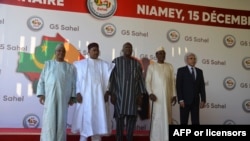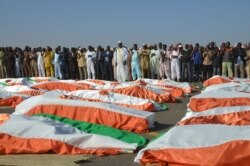Leaders of the G5 Sahel nations held summit talks in Niamey Sunday, after the death last week of 71 Niger soldiers in a jihadist attack, calling for closer cooperation and international support in the battle against the Islamist threat.
Burkina Faso President Roch Marc Christian Kabore, whose country holds the rotating presidency of the regional G5 group, called for a minute's silence for the victims of Tuesday's attack at a military camp in Inates, near the Mali border.
"These endless attacks carried out by terrorist groups in our region remind us not only of the gravity of the situation, but also the urgency for us to work more closely together," said Kabore.
"The terrorist threat against the Sahel countries is getting worse," said Niger's President Mahamadou Issoufou, the host of the summit.
The attacks were aimed not just at military targets but increasingly "civilian populations, notably traditional local leaders".
Earlier four of the five Sahel leaders paid homage at the graves of 71 Niger military personnel killed. Kabore and Issoufou attended along with Mali's Ibrahim Boubakar Keita, Chad's Idriss Deby Itno for the short ceremony at an air base in Niamey.
The Islamic State group claimed responsibility for the assault, in which hundreds of jihadists attacked a camp near the border with Mali with shells and mortars.
The attack in Inates in the western Tillaberi region was the deadliest on Niger's military since Islamist militant violence began to spill over from neighboring Mali in 2015, and dealt a blow to efforts to roll back jihadism in the Sahel.
At Sunday's ceremony, a large panel painted in the orange, white and green of the Niger flag bore the inscription; "rest in peace, worthy and valiant sons of the nation. The Fatherland will be eternally grateful".
The G5 leaders announced on Saturday they would hold the extraordinary summit in Niger to show solidarity and to "consult" after the large-scale attack. The meeting had originally been due to take place in the Burkinabe capital Ouagadougou.
Niger has been observing three days of national mourning from Friday to Sunday.
Militant violence has spread across the vast Sahel region, especially in Burkina Faso and Niger, having started when armed Islamists revolted in northern Mali in 2012.
In the last four months, the insurgency has claimed the lives of more than 230 soldiers in Niger, Mali and Burkina Faso. Last month, 13 French troops were killed in a helicopter collision while hunting jihadists in northern Mali.
Thousands of civilians have died and about 650,000 have been forced to flee their homes since the jihadist revolt began.
Analysts note an escalation in the jihadists' operational tactics, which seem to have become bolder and more complex in recent months.
From hit-and-run raids by a small group of Kalashnikov-armed guerrillas, the jihadists are now carrying out operations that involve hundreds of fighters, armed with mortars and using vehicles for suicide attacks.
Ranged against them are the impoverished armies of Chad, Burkina Faso, Mali, Mauritania and Niger, plus a 4,500-man French force in the Sahel and the 13,000-man U.N. force in Mali, MINUSMA.
Tuesday's attack prompted French President Emmanuel Macron to postpone a meeting scheduled for next week in the southwestern French town of Pau, where he and five presidents from the Sahel were due to discuss security in the region.
The talks will now take place early next year.
The Sahel region of Africa lies to the south of the Sahara Desert and stretches across the breadth of the African continent.





